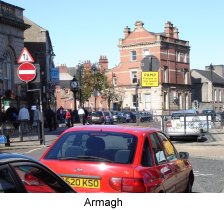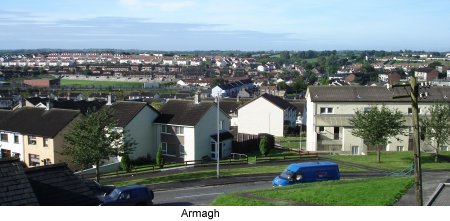Erklæringer om retableringen af nordirsk selvstyre
2006-04-06
Following is the entire text of today's Joint Statement by
Irish premier Bertie Ahern and British PM Tony Blair.
Armagh, April 6th, 2006
2. When we last met, we noted the historic progress represented by the IRA statement of July 2005. We are convinced that the IRA no longer represents a terrorist threat. By any standards, that is a momentous stage in the history of Northern Ireland. On that basis, we have made it clear that all parties should engage in political dialogue. We have also made it clear that all parties should support the police as the most effective way of addressing continuing concerns about criminality. 3. We cannot force anyone to enter the political institutions. Every part of the political process over the past eight years has been voluntary. What we can do is to set out what we believe to be a practical framework and a reasonable timescale for moving forward. While we are conscious of the view that further confidence needs to be established, we also know that time alone is not enough: trust will not build itself in the absence of positive engagement by all parties. Everyone in Northern Ireland is aware of the dangers of a political vacuum. 4. The Assembly will therefore be recalled on 15 May. Recognising that it has not sat for nearly four years, it seems sensible to give the Assembly a short period in which to prepare for government as envisaged by paragraph 35 of Strand One of the Good Friday Agreement. The Assembly's primary responsibility would be to elect a First and Deputy First Minister as soon as possible, to allocate Ministerial posts under the d'Hondt formula and to make other preparations for Government within Northern Ireland and in the North/South and East/West fields. 5. As soon as the Assembly elects a First and Deputy First Minister on a cross-community basis and forms an Executive, power will automatically be devolved to the Assembly, as happened in December 1999, and all its functions will be resumed. At that point the British Government's power to suspend the Assembly will lapse for good. 6. If, despite best efforts, the Assembly is not able to elect a First and Deputy First Minister on a cross-community basis within the normal six week period, we would be prepared to allow a further period of 12 weeks after the summer recess in which to form an Executive and we would expect it to do so at the earliest opportunity within this timeframe. 8. It would of course also be open to the Assembly to prepare for Government by considering issues which the Executive will have to deal with, such as future economic strategy, water rates, public administration and education. Ministers would naturally take account of views which command cross-community support within the Assembly. 9. While it is reasonable to give the Assembly a little more time, there must be a clear limit. We said in January that a power-sharing Executive must be formed this year. If by 24 November the Assembly has failed to achieve this, we do not believe that any purpose would be served by a further election at that point or a few months later in May 2007. We do not think that the people of Northern Ireland should be asked to participate in elections to a deadlocked Assembly. There would be no choice but to cancel salaries and allowances for MLAs and to defer restoration of the Assembly and Executive until there is a clear political willingness to exercise devolved power. The Governments would, of course, stand ready to facilitate full restoration when all parties indicate such willingness. 10. If restoration of the Assembly and Executive has to be deferred, the Governments agree that this will have immediate implications for their joint stewardship of the process. We are beginning detailed work on British-Irish partnership arrangements that will be necessary in these circumstances to ensure that the Good Friday Agreement, which is the indispensable framework for relations on and between these islands, is actively developed across its structures and functions. This work will be shaped by the commitment of both Governments to a step-change in advancing North-South co-operation and action for the benefit of all. 11. The British Government will introduce emergency legislation to facilitate this way forward. It will set out clearly the limited timescale available to the Assembly to reach agreement. In parallel with the recalling of the Assembly, we will engage intensively with the parties to establish the trust necessary to allow the institutions not only to function but to flourish. There is a great deal of work to be done. The Governments will do all in their power to restore the institutions and return devolved Government to those elected by the people of Northern Ireland. But the final decisions are for the parties. We hope they will seize the opportunity to move forward.
2006-04-06
It's about giving political responsibility back to Northern Ireland's politicians. When Prime Minister Blair and I met in Dublin earlier this year, we said we wanted to see the restoration of devolved partnership Government in Northern Ireland as soon as possible this year. In recent months, the parties have been asking the Governments to give direction and leadership. We are now doing so and outlining our agreed strategy for the restoration of the Assembly and devolved government. It is fitting that the location of this meeting and announcement is Navan Fort (or Emain Macha as it is known in Irish). As the ancient capital of Ulster, it played a central role in the very early history of this island. And so today, once again, this place of history is centre stage in the politics of this island. The message of the Irish people in 1998 was clear. They supported the Good Friday Agreement. They endorsed the new arrangements and new politics of that Agreement. Last year saw real, undeniable, progress. Progress many thought could never be achieved. The time has now come to build on all of this and to move the process on. Anyone with any knowledge of Northern Ireland knows that leaving things as they are is neither responsible nor feasible. To do so is to store up difficulties for the future. Nobody should want that. And as two Governments we certainly don't want that. Both the Prime Minister and I are united in our conviction that the devolved government of the Good Friday Agreement is what will best allow Northern Ireland to move on and to prosper. Northern Ireland is a place of very special and difficult circumstances. That is why we negotiated and agreed the Good Friday Agreement eight years ago next week. The potential benefits of partnership government in Northern Ireland are obvious and real. No one will disagree that devolved government can respond to local needs in a way that direct rule never can. It offers the best hope to those who are most marginalised in society. The best care for the sick. The greatest opportunity to business. The best future for the young. And it offers the best hope of healing the deep division that is at the heart of Northern Ireland. It is what the people of Ireland, North and South, voted overwhelmingly for eight years ago. Partnership government is exactly what it says: a partnership. The two Governments cannot make it happen. Each party must cross the threshold to Government voluntarily. But what the Governments can do is help create the conditions that are most likely to enable partnership to succeed. That is the responsibility that we are shouldering today. Today, we are placing Northern Ireland's politicians back on the path to power. We are giving them the opportunity to take power back into their own hands. There is no more obvious responsibility for an elected politician. When the Assembly is recalled on 15th May, its primary responsibility will be to elect a First and Deputy First Minister and establish an Executive within six weeks. We believe that the arguments for forming a partnership government are compelling. And we want to see this achieved. There is a particular onus on those parties with the largest mandate and who will occupy the positions of leadership in a restored Executive. They acquired this enhanced status at the elections in 2003. They are now being asked to exercise this responsibility in a positive way. We want them to engage with one another and everyone else to give this initiative a chance. They may not have an opportunity again for quite some time if they cannot make it work on this occasion. It is time, therefore, to talk. And it is time to agree. People are entitled to firm assurances, if there is deadlock, that it will not be allowed to continue indefinitely. The restored Assembly will, therefore, have a limited period of time to form an Executive. We have reached a point in the process where the parties must decide. We are giving them a reasonable but finite time to do so. If an Executive cannot be successfully formed in the time available, then the Governments are also agreed that we will exercise our responsibilities to ensure that the Agreement is implemented to the maximum possible extent for the benefit of all communities. We will do so together because at that point it will be the only way to advance a process to which we are both firmly committed and in which we have already invested enormous personal energy and determination. I have given some of the best years of my political life to this process. It is an investment that I would happily make over and over again in the interests of peace and agreement on this island. The challenge now is to finish the job. We believe that this is possible. And that is why we are here today. Our joint strategy represents the best opportunity to pave the way for the restoration of devolved government this year. No reasonable person could see it as anything other than an honourable and fair attempt to enable the parties do the work they were elected to do. We are today urging Northern Ireland's politicians to take this opportunity. And we hope they will do so. The firm partnership and joint stewardship of the two Governments have proved vital to the peace process. I commend the Prime Minister determination's to see this process brought to successful finality. Together, both he and I will continue to do all in our power to give effect to the will of the people of this island.
BRITISH AND IRISH GOVERNMENTS' JOINT STATEMENT
 1. In recent months we have held discussions with all the political parties in Northern Ireland with a view to restoring the political institutions and building on the peace and prosperity which have flowed from the Good Friday Agreement.
1. In recent months we have held discussions with all the political parties in Northern Ireland with a view to restoring the political institutions and building on the peace and prosperity which have flowed from the Good Friday Agreement. 7. We are also conscious that all parties have made proposals for the better functioning of the institutions and that discussion on these issues has not yet concluded. It would be open to the parties to continue these discussions with each other and with the Governments, as appropriate, so that consideration could be given to proposals for the implementation of the Agreement, including changes to Strands 1 to 3 in the context of a commitment by all involved to participate in a power-sharing Executive.
7. We are also conscious that all parties have made proposals for the better functioning of the institutions and that discussion on these issues has not yet concluded. It would be open to the parties to continue these discussions with each other and with the Governments, as appropriate, so that consideration could be given to proposals for the implementation of the Agreement, including changes to Strands 1 to 3 in the context of a commitment by all involved to participate in a power-sharing Executive.
Remarks by An Taoiseach, Bertie Ahern, at Navan Fort, Armagh:
 The callous murder of Denis Donaldson earlier this week is a brutal reminder of Northern Ireland's tortured and tragic past. Today here in Armagh is about putting that past behind us once and for all. It's about putting politics centre stage.
The callous murder of Denis Donaldson earlier this week is a brutal reminder of Northern Ireland's tortured and tragic past. Today here in Armagh is about putting that past behind us once and for all. It's about putting politics centre stage.